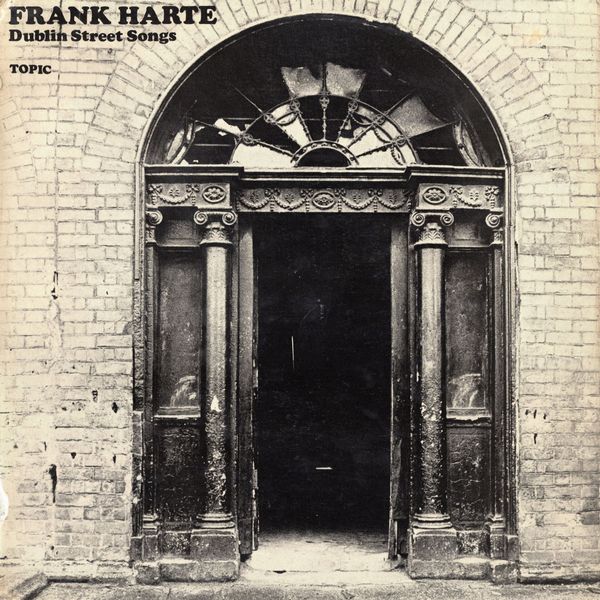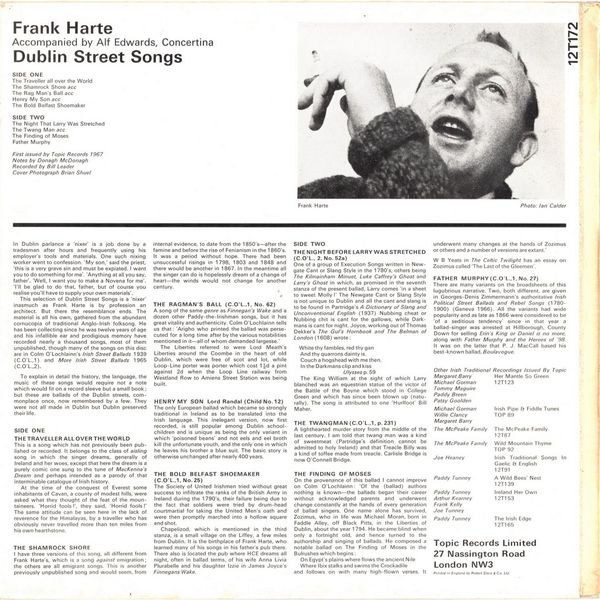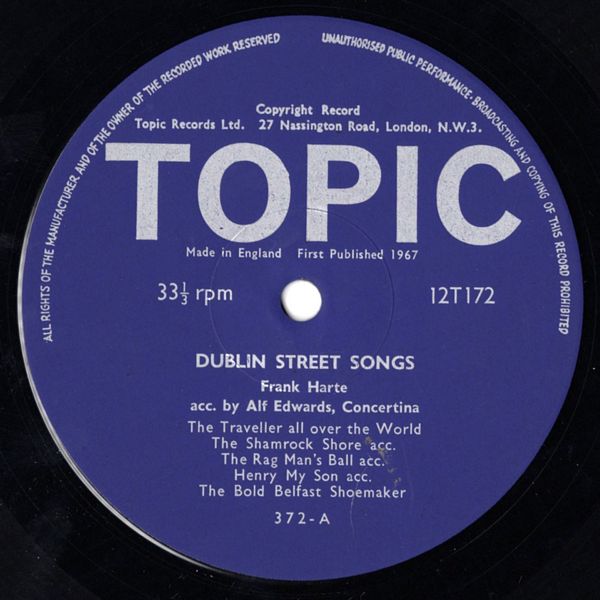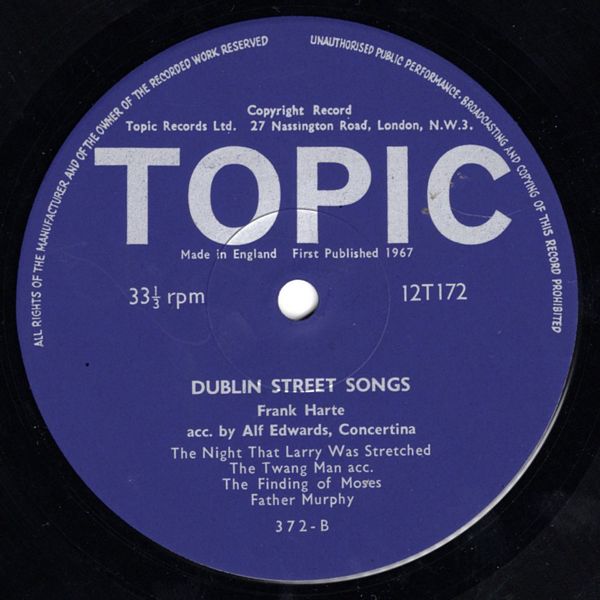
 |


 |
Sleeve Notes
In Dublin parlance a 'nixer' is a job done by a tradesman after hours and frequently using his employer's tools and materials. One such nixing worker went to confession. 'My son,' said the priest, 'this is a very grave sin and must be expiated. I want you to do something for me'. 'Anything at all you say, father'. 'Well, I want you to make a Novena for me'. 'I'll be glad to do that, father, but of course you realise you'll have to supply your own materials'.
This selection of Dublin Street Songs is a 'nixer' inasmuch as Frank Harte is by profession an architect. But there the resemblance ends. The material is all his own, gathered from the abundant cornucopia of traditional Anglo-Irish folksong. He has been collecting since he was twelve years of age and his infallible ear and prodigious memory have recorded nearly a thousand songs, most of them unpublished, though many of the songs on this disc are in Colm O'Lochlainn's Irish Street Ballads 1939 (C.O'L.,1) and More Irish Street Ballads 1965 (C.O'L.,2).
To explain in detail the history, the language, the music of these songs would require not a note which would fit on a record sleeve but a small book; but these are ballads of the Dublin streets, commonplace once, now remembered by a few. They were not all made in Dublin but Dublin preserved their life.
THE TRAVELLER ALL OVER THE WORLD — This is a song which has not previously been published or recorded. It belongs to the class of aisling song in which the singer dreams, generally of Ireland and her woes, except that here the dream is a purely comic one sung to the tune of MacKenna's Dream and perhaps intended as a parody of that interminable catalogue of Irish history.
At the time of the conquest of Everest some inhabitants of Cavan, a county of modest hills, were asked what they thought of the feat of the mountaineers. 'Horrid fools!', they said, 'Horrid fools!' The same attitude can be seen here in the lack of reverence for the Himalayas, by a traveller who has obviously never travelled more than ten miles from his own hearthstone.
THE SHAMROCK SHORE — I have three versions of this song, all different from Frank Harte's, which is a song against emigration; the others are all emigrant songs. This is another previously unpublished song and would seem, from internal evidence, to date from the 1850's — after the famine and before the rise of Fenianism in the 1860's. It was a period without hope. There had been unsuccessful risings in 1798, 1803 and 1848 and there would be another in 1867. In the meantime all the singer can do is hopelessly dream of a change of heart — the winds would not change for another century.
THE RAGMAN'S BALL (C.O'L.,1, No. 62) — A song of the same genre as Finnegan's Wake and a dozen other Paddy-the-Irishman songs, but it has great vitality and authenticity. Colm O'Lochlainn tells us that: 'Arigho who printed the ballad was persecuted for a long time after by the various notabilities mentioned in it — all of whom demanded largesse.'
The Liberties referred to were Lord Meath's Liberties around the Coombe in the heart of old Dublin, which were free of scot and lot, while Loop-Line porter was porter which cost 1½d a pint against 2d when the Loop Line railway from Westland Row to Amiens Street Station was being built.
HENRY MY SON Lord Randal (Child No. 12) — The only European ballad which became so strongly traditional in Ireland as to be translated into the Irish language. This inelegant version, now first recorded, is still popular among Dublin school-children and is unique as being the only variant in which 'poisoned beans' and not eels and eel broth kill the unfortunate youth, and the only one in which he leaves his brother a blue suit. The basic story is otherwise unchanged after nearly 400 years.
THE BOLD BELFAST SHOEMAKER (C.O'L.,1, No. 25) — The Society of United Irishmen tried without great success to infiltrate the ranks of the British Army in Ireland during the 1790's, their failure being due to the fact that soldiers were tried by drum-head court martial for taking the United Men's oath and were then promptly marched into a hollow square and shot.
Chapelizod, which is mentioned in the third stanza, is a small village on the Liffey, a few miles from Dublin. It is the birthplace of Frank Harte, who learned many of his songs in his father's pub there. There also is located the pub where HCE dreams all night, often in ballad terms, of his wife Anna Livia Plurabelle and his daughter Izzie in James Joyce's Finnegans Wake.
THE NIGHT BEFORE LARRY WAS STRETCHED (C.O'L., 2. No. 52a) — One of a group of Execution Songs written in Newgate Cant or Slang Style in the 1780's, others being The Kilmainham Minuet. Luke Caffrey's Ghost and Larry's Ghost in which, as promised in the seventh stanza of the present ballad, Larry comes 'in a sheet to sweet Molly !' The Newgate Cant or Slang Style is not unique to Dublin and all the cant and slang is to be found in Partridge's A Dictionary of Slang and Unconventional English (1937) Nubbing cheat or Nubbing chit is cant for the gallows, while Dark-mans is cant for night. Joyce, working out of Thomas Dekker's The Gul's Hornbook and The Belman of London (1608) wrote:
White thy fambles, red thy gan
And thy quarrons dainty is.
Couch a hogshead with me then.
In the Darkmans clip and kiss — Ulysses p. 59
The King William at the sight of which Larry blanched was an equestrian statue of the victor of the Battle of the Boyne which stood in College Green and which has since been blown up (naturally). The song is attributed to one 'Hurlfoot' Bill Maher.
THE TWANGMAN (C.O'L.,1, p.231) — A lighthearted murder story from the middle of the last century. I am told that twang man was a kind of sweetmeat (Partridge's definition cannot be admitted to holy Ireland) and that Treacle Billy was a kind of toffee made from treacle. Carlisle Bridge is now O'Connell Bridge.
THE FINDING OF MOSES — On the provenance of this ballad I cannot improve on Colm O'Lochlainn: 'Of the (ballad) authors nothing is known — the ballads began their career without acknowledged parents and underwent change constantly at the hands of every generation of ballad singers. One name alone has survived, Zozimus, who in life was Michael Moran, born in Faddle Alley, off Black Pitts, in the Liberties of Dublin, about the year 1794. He became blind when only a fortnight old, and hence turned to the authorship and singing of ballads. He composed a notable ballad on The Finding of Moses in the Bulrushes which begins:
On Egypt's plains where flows the ancient Nile
Where Ibix stalks and swims the Crockadile
and follows on with many high-flown verses. It underwent many changes at the hands of Zozimus or others and a number of versions are extant.'
W B Yeats in The Celtic Twilight has an essay on Zozimus called 'The Last of the Gleemen'.
FATHER MURPHY (C.O'L.,1, No. 27) — There are many variants on the broadsheets of this lugubrious narrative. Two, both different, are given in Georges-Denis Zimmermann's authoritative Irish Political Street Ballads and Rebel Songs (1780-1900, Geneva 1966). All the variants had wide popularity and as late as 1866 were considered to be 'of a seditious tendency' since in that year a ballad-singer was arrested at Hillborough, County Down for selling Erin's King or Daniel is no more. along with Father Murphy and the Heroes of '98. It was on the latter that P. J. MacCall based his best-known ballad, Boulavogue.